| Srl | Item |
| 1 |
ID:
104448
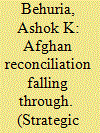

|
|
|
| 2 |
ID:
104458
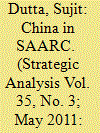

|
|
|
| 3 |
ID:
104462
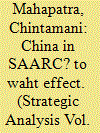

|
|
|
| 4 |
ID:
104460
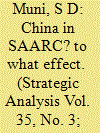

|
|
|
| 5 |
ID:
104461
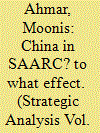

|
|
|
| 6 |
ID:
104459


|
|
|
| 7 |
ID:
104463
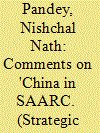

|
|
|
| 8 |
ID:
104452
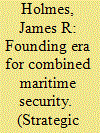

|
|
|
|
|
| Publication |
2011.
|
| Summary/Abstract |
In a nutshell the article posits that American naval power, and thus the United States' ability to police the seas, will continue to decline, and that Washington is attempting to compensate by fashioning a new paradigm of multinational maritime security. With no likely candidate for a global navy in the offing the challenge is to create one or more multinational guarantors of free navigation. I attempt to gaze into the future, discerning the likely dynamics of this coalition-building project.
|
|
|
|
|
|
|
|
|
|
|
|
|
|
|
|
| 9 |
ID:
104446


|
|
|
| 10 |
ID:
104454


|
|
|
| 11 |
ID:
104447
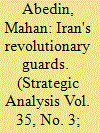

|
|
|
| 12 |
ID:
104449


|
|
|
| 13 |
ID:
104457
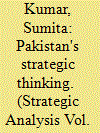

|
|
|
|
|
| Publication |
2011.
|
| Summary/Abstract |
The strategic outlook of the political, bureaucratic and military elites in Pakistan was shaped by historical exigencies, geopolitical location, Pakistan's self-perception, and its Islamic credentials. Pakistan's military-dominated leadership formulated strategies towards regional and extra-regional powers based on its threat perceptions. The strategies adopted have not necessarily resulted in fully achieving the objectives for which they were formulated.
|
|
|
|
|
|
|
|
|
|
|
|
|
|
|
|
| 14 |
ID:
104455


|
|
|
|
|
| Publication |
2011.
|
| Summary/Abstract |
Rampant piracy off the Somalia coast has brought the strife-ridden country back into attention. Economic hardship, and a deep resentment and anger against foreign exploitation of Somalia's maritime resources, have inspired the pirates to declare themselves 'coast guards of Somalia'. However, the growing attacks by the pirates have had an adverse impact on global commercial shipping. The international community has responded to this predicament by massive naval deployments in the Gulf of Aden. This article argues that the long-term solution to piracy on the high seas off Somalia lies in addressing the chaos on shore. Such an approach, however, is strewn with numerous challenges. The role of external actors like Ethiopia, Eritrea and the United States has contributed to the instability. The growing division and infighting between Somalian Islamists, violations of the UN arms embargo and insufficient influence of the African Union Mission in Somalia (AMISOM) have further exacerbated the problems.
|
|
|
|
|
|
|
|
|
|
|
|
|
|
|
|
| 15 |
ID:
104450
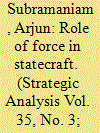

|
|
|
| 16 |
ID:
104456


|
|
|
|
|
| Publication |
2011.
|
| Summary/Abstract |
The Andaman and Nicobar islands are of immense strategic significance for India. The geographical configuration and the location of the island chain in the Bay of Bengal safeguards India's eastern seaboard as well the approaches to the Indian Ocean from the east. Its proximity to the Southeast Asian region enables India to forge friendly relations with its Association of South East Asian Nations (ASEAN) neighbours. The physical isolation and remoteness of the archipelago, however, make it vulnerable to conventional and non-conventional threats. At present, any possibility of a conventional threat to the Andaman and Nicobar Islands appears remote given India's friendly ties with its Southeast and East Asian neighbours. Nevertheless, military intervention in the Indian Ocean by extra-regional powers, especially China, remains a potential cause of concern. Meanwhile, non-conventional threats such as poaching of marine and forest resources, illegal migration, arms smuggling and natural disasters have been posing serious challenges to the internal security of the island chain. Steps to address these problems have been undertaken by the government, but the issues of remoteness, inadequate infrastructure, poor coordination among security agencies and pervasive underdevelopment create hurdles. Building critical infrastructure and sustainable economic development is, therefore, imperative for securing the Andaman and Nicobar Islands.
|
|
|
|
|
|
|
|
|
|
|
|
|
|
|
|
| 17 |
ID:
104464


|
|
|
| 18 |
ID:
104451


|
|
|
| 19 |
ID:
104453
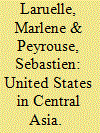

|
|
|
|
|
| Publication |
2011.
|
| Summary/Abstract |
This article focuses on the evolving place of the US in the Central Asian arena, analysing how US interests have changed in this region since the 1990s. It studies how strategic relations were transformed around the NATO Partnership for Peace, the growing cooperation in the Caspian Sea, and the building of a regional security architecture surrounding Afghanistan. It also analyses Washington's difficulties in promoting 'civil society' and the limits of the US economic engagement in the region. It concludes that the United States must show more interest in societal development, and demonstrate its willingness to respond to Central Asian needs and perspectives.
|
|
|
|
|
|
|
|
|
|
|
|
|
|
|
|